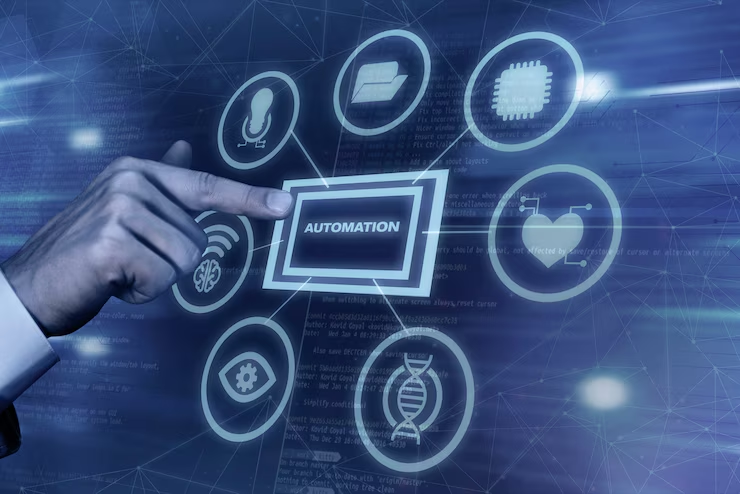AI Automation: Enhancing Efficiency in SaaS Platforms
The world of Software as a Service (SaaS) is rapidly evolving, and AI automation is at the forefront of this transformation. As businesses strive to improve efficiency and stay competitive, integrating AI into SaaS platforms has become a game-changer. This blog post will explore how AI automation is enhancing efficiency in SaaS platforms, offering insights into its benefits, applications, and future potential.

Table of Contents
1. Introduction to AI Automation in SaaS
2. Benefits of AI Automation in SaaS
3. Key Applications of AI in SaaS Platforms
4. Challenges and Considerations
5. The Future of AI in SaaS
6. Conclusion
7. FAQ Section
Introduction to AI Automation in SaaS 🤖
The integration of AI automation in SaaS platforms is not just a trend; it’s a necessity for businesses seeking to optimize their operations. AI automation leverages machine learning and advanced algorithms to automate repetitive tasks, enhance decision-making processes, and provide personalized user experiences.
In the SaaS industry, where adaptability and efficiency are paramount, AI automation helps companies streamline processes, reduce errors, and focus on strategic growth. But what exactly are the benefits that AI brings to SaaS platforms?
Benefits of AI Automation in SaaS 🌟
Increased Efficiency and Productivity
AI automation can handle mundane and repetitive tasks, freeing up human resources for more important and creative work. This leads to increased productivity and allows teams to focus on tasks that require critical thinking and innovation.
Enhanced Data Analysis 📊
SaaS platforms generate massive amounts of data daily. AI tools can analyze this data more efficiently than traditional methods, uncovering patterns and insights that can drive business decisions.
Improved Customer Experience
AI can personalize user experiences by analyzing user behavior and preferences. From chatbots providing instant support to personalized recommendations, AI enhances customer satisfaction and engagement.
Cost Reduction 💰
By automating tasks and improving operational efficiency, AI can significantly reduce the costs associated with manual processes and human errors.
Key Applications of AI in SaaS Platforms 🛠️
Automated Customer Support
One of the most popular applications of AI in SaaS is in customer support. AI-powered chatbots and virtual assistants offer 24/7 support, handling routine inquiries and directing complex issues to human agents.
Predictive Analytics
AI algorithms can predict future trends and behaviors, enabling businesses to make proactive decisions. This is particularly valuable in sales forecasting, customer retention strategies, and market analysis.
Workflow Automation 🔄
AI streamlines workflows by automating tasks such as data entry, report generation, and communication processes. This reduces the time spent on administrative tasks and increases overall efficiency.
Challenges and Considerations ⚠️
Despite its benefits, AI automation in SaaS is not without its challenges. Implementing AI requires a significant investment in technology and training. Additionally, concerns about data privacy and security must be addressed to ensure compliance with regulations and maintain user trust.
Moreover, while AI can automate many tasks, human oversight remains crucial to manage exceptions and ensure ethical use of AI technologies.
The Future of AI in SaaS 🚀
The future of AI in SaaS looks promising. As technology continues to advance, AI will likely become more sophisticated, offering even greater capabilities and applications. We can expect AI to drive innovation, enhance user experiences, and provide new opportunities for businesses to grow and succeed.
As AI becomes more integrated into SaaS platforms, it will also play a pivotal role in shaping industry standards and practices, creating a more dynamic and competitive landscape.
Conclusion
AI automation is revolutionizing the SaaS industry by enhancing efficiency, reducing costs, and improving user experiences. While challenges exist, the potential benefits far outweigh the drawbacks. Embracing AI in SaaS platforms is not just about staying ahead; it’s about creating more value for businesses and their customers.
FAQ Section ❓
1. How does AI improve efficiency in SaaS platforms?
AI improves efficiency by automating repetitive tasks, providing better data analysis, and enhancing customer experiences, allowing businesses to focus on strategic growth.
2. What are some common AI applications in SaaS?
Common AI applications in SaaS include automated customer support, predictive analytics, and workflow automation, which streamline operations and improve service quality.
3. Are there any challenges associated with implementing AI in SaaS?
Yes, challenges include the need for significant investment, data privacy concerns, and the importance of human oversight to manage exceptions and ensure ethical AI use.
4. What is the future of AI in SaaS platforms?
The future is bright, with AI expected to drive innovation, enhance user experiences, and shape industry standards, creating a dynamic and competitive landscape.
Contact Me For Your Project
Whether you’re a startup or scaling your business, I offer powerful SaaS solutions to bring your ideas to life.
👉 Let’s build your next big thing — contact me today



